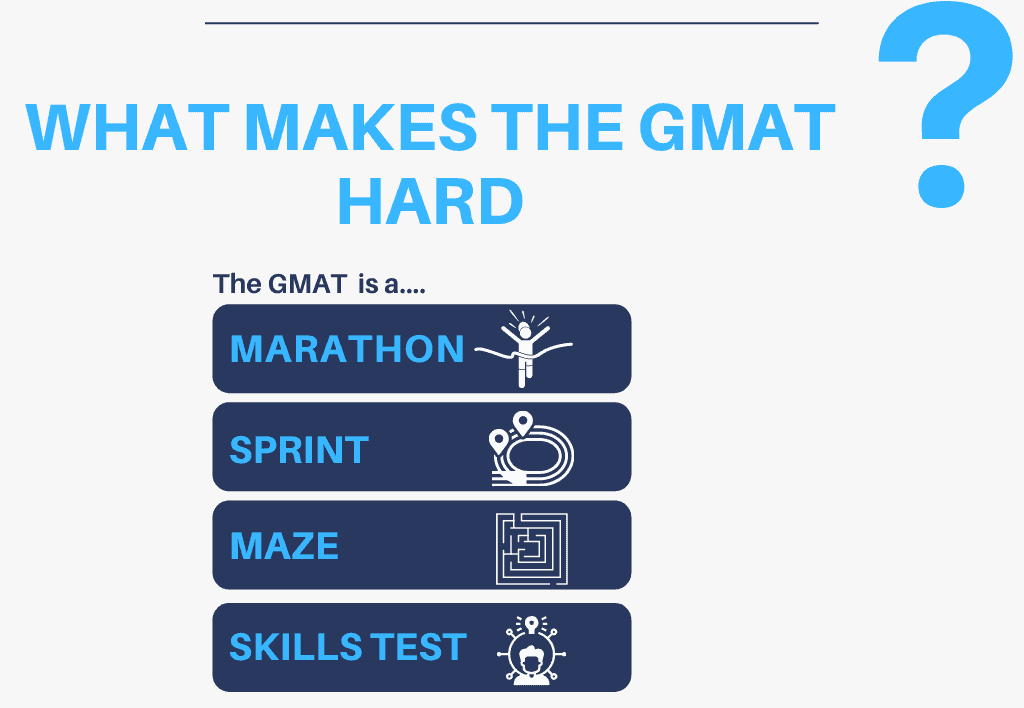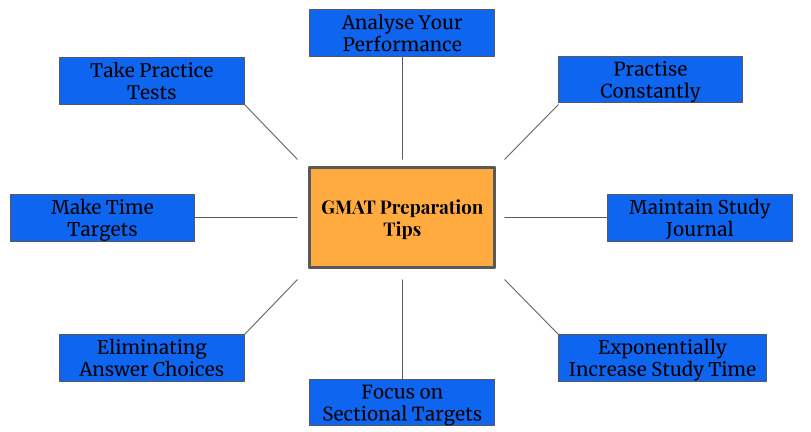Every student who has prepared for the MBA or is preparing for it tackles this question in their lifetime. So if you are preparing for GMAT and need an answer to the question “How hard is GMAT?” you are surely in the right place.
Every year more lakhs of students around the globe appear for the GMAT exam. All the students aiming to get admitted into their dream college prepare to get a score of more than 720 to secure their place. More competition and the urge to score more in the examination make the GMAT test difficult.
In the following article, I have compiled all the details about the GMAT examination and why the exam is considered hard. I have also included details on topics like the length of the GMAT examination and tips and tricks to score well on the test.
So let’s start with the main issue.
How Long Is GMAT?
GMAT is a computer-adaptive test required to get admitted into MBA colleges worldwide. The test is created to measure the students’ skills like reading, quantitative abilities, critical thinking, and writing.
The test is divided into four sections and includes different numbers of questions.
The following table will help you understand the GMAT test’s basic structure.
| Section | Time | Questions | Skill required |
| Analytical Writing Assessment | 30 minutes | 12 questions | Analysis of argument |
| Integrated Reasoning | 30 minutes | 31 questions | Table analysis, multi-source reasoning, graphic interpretation, and two-part analysis. |
| Quantitative Reasoning | 62 minutes | 36 questions | Problem-solving, data sufficiency. |
| Verbal Reasoning | 65 minutes | 36 questions | Critical reasoning, Reading comprehension, Sentence correction. |
The GMAT tests last up to 3.5 hours. You can select the order of the sections. There are two breaks during the examination. Both breaks last for eight minutes.
How hard is the GMAT?
More competition and the urge to score more in the examination make the GMAT test difficult. Moreover, the GMAT is a computer-adaptive test. The difficulty of the questions will be adjusted according to your performance in the previous test.
If you answer the previous question correctly, the next question will be difficult. If you have answered the previous question wrong, your next question will be easy. The first question in the section always comes with medium difficulty.
561 is the average score on the GMAT test out of 800. It was reported that only 27% of the students who appeared for the test scored above 650, and only 12% could score higher than 700.
The difficulty of Gmat majorly depends on the score you aim for and how much you have prepared for it.
What Other Factors make the GMAT hard?
Time management is one of the most important factors contributing to the difficulty of the test. The curriculum for the GMAT test includes the topics that you have studied in your high school years. This makes the test fair and equal for all the students studying in different areas of expertise. Hence the time pressure makes the test difficult and provides the required difficulty level.

You only get 1.8 minutes to solve your questions in the verbal section, while 2 minutes for each question in the Quants section.
On the other hand, the questions may be from the high school curriculum, but they are twisted and made hard for the students. This helps in checking their thinking ability.
You will have to be good in all sections of the test. It will help you to earn a good score. However, your final score will stay high if you are strong in a certain section.
If you are a person with test anxiety, you will surely have to work on it, as it can adversely affect your performance on the test.
How Long Do You Need To Study For The GMAT?
It is advised that you must start preparing for GMAT at least 9 to 12 months earlier. This gives students an edge over other test takers. However, most students prepare at least 6 months before the test to score well on GMAT.

If you start 3 to 4 months before the examination, you must dedicate your entire day studying for the test. The test repeaters start 2 or 1 month before the examination if they have scored well but still need to get the required college.
Start 9 months before the test if you are a beginner. If you are a repeater, you can start at least 5 to 6 months before the examination. This will allow you to complete the Gmat curriculum and help you work on your weaknesses.
Tips For Scoring Well In GMAT
- Understand The Format Of The Test:
Knowing the format of the GMAT and the pattern of the test will help you prepare well for the test. In addition, you will be able to prepare for the test accordingly.
You must know which types of questions are asked in all the sections of the GMAT. Also, note the difficulty level of the questions asked in the test. You can also watch out and note all the common questions in the GMAT test.
- Create A Study Plan:
You might be aware of your weaknesses and strengths. Hence it is better to create a study plan for yourself, work on your weaknesses, and strengthen your strengths.
This will help you to keep track of your preparations. You can keep track of your score and aim the score accordion to the college to which you want to get admitted.
Creating a personalized study plan will help you to manage your time according to your needs.
- Select The Proper And Authentic Resources For Preparing For The Test:
Many classes and resources available on the web will help you prepare for the GMAT. You need to select the ones that cater to your needs and will help you to excel at all the sections.
You can choose the resources to boost your score and provide a proper direction while preparing for the GMAT.
- Work On Managing Time:
While you practice questions during test preparation, do keep track of time. Unfortunately, many students score low as they need help managing their time properly.
Poor time management is why students score low on their GMAT tests. Keeping track of your time while you prepare for the test and reducing the time required for the question will help you during the test.
- Give Mock Tests And Analyze Them:
Mock tests will prepare you to give the GMAT test. It will help you understand the best approach for you during the test. You will also get a basic idea of the type of questions asked in the test.
Giving mocks helps the test takers to manage their time. You can try different time management techniques and use the best technique for you in the final GMAT test.
Analyzing will help you understand what mistakes you keep repeating. This will help you to avoid these mistakes in the Gmat test. You will also understand the areas that you are weak in and the areas that are your strengths. This way, you can work on your final strategy and score well on GMAT.
- Beat Exam Anxiety:
Preparing for the test in the last few months and giving your best while practicing will surely create anxiety a few days before your exam. I recommend you stop studying 2 days before your GMAT test. You can meditate and relax your mind.
Getting rid of stress and managing your emotional questions will help you to score well on your GMAT. You need good control of EQ if something goes wrong during the test. You must manage while you answer the next questions and try to score well.
Is the GMAT Harder Than the LSAT?
It is a common question among students planning to pursue graduate studies or law school – which test is harder, the GMAT or the LSAT?
While both tests are designed to assess critical thinking, problem-solving, and analytical skills, there are distinct differences. First, the GMAT focuses more on quantitative reasoning and data analysis, while the LSAT emphasizes reading comprehension and logical reasoning.
Additionally, the GMAT is taken by students who wish to pursue business school, while the LSAT is taken by those who wish to attend law school. Therefore, determining which test is harder depends on one’s strengths and weaknesses in these areas.
Some may find the GMAT harder due to the challenging math sections, while others may find the LSAT harder due to the dense and complex reading passages.
Regardless of which test is harder, both require dedicated preparation and practice to achieve a high score.
Related Read:
Conclusion: How Hard Is The GMAT
That’s all about GMAT.
GMAT requires hard work to excel and score great to land your dream college.
“How hard is GMAT?” The answer to this question varies from person to person. If you already possess the skills required to score well in GMAT. You may feel it is less complicated. Ultimately, all that matters is your patience, determination, and the effort you put into the preparation.
The above article has helped you understand the details of the GMAT test. For example, students appearing for the GMAT and GRE have reported that GMAT is comparatively easier than GRE. So what are your views about it? Let us know in the comment section below.
FAQs
Is GMAT hard for the average student?
Every year more than 200,000 students attempt the GMAT. It is reported that only 6% of the students can score more than 720 and get admitted to their dream college. GMAT is surely hard for even the top students; however, with hard work and determination, average students can easily crack the exam.
How hard is it to get 700 on GMAT?
Scoring 700 or more in GMAT is surely a hard task. You will need great dedication and hard work to score more on the GMAT. You will also need to develop your skills in various subjects and develop your problem-solving skills.
Are 3 months enough for GMAT?
Yes. Three months are enough to prepare for the GMAT. You must dedicate 10 to 12 hours daily to score well in the GMAT within 3 months. If you are already familiar with the topics in the GMAT curriculum, you can dedicate at least 6 to 7 hours daily to score well and get admitted into your dream college.
How many GMAT attempts are too many?
You can attempt the GMAT a maximum of 8 times in your lifetime. It does not matter how many years gap between two attempts or if there is no age limit for the exam. You are not eligible for the GMAT test after you have attempted it 8 times.
